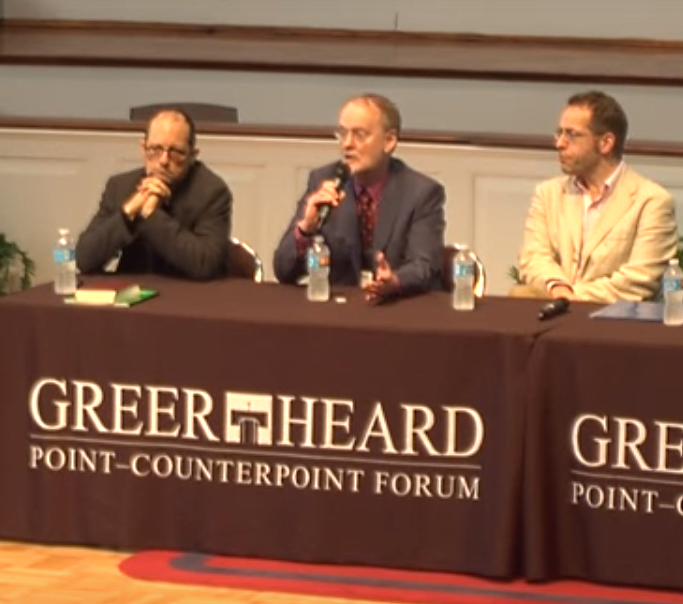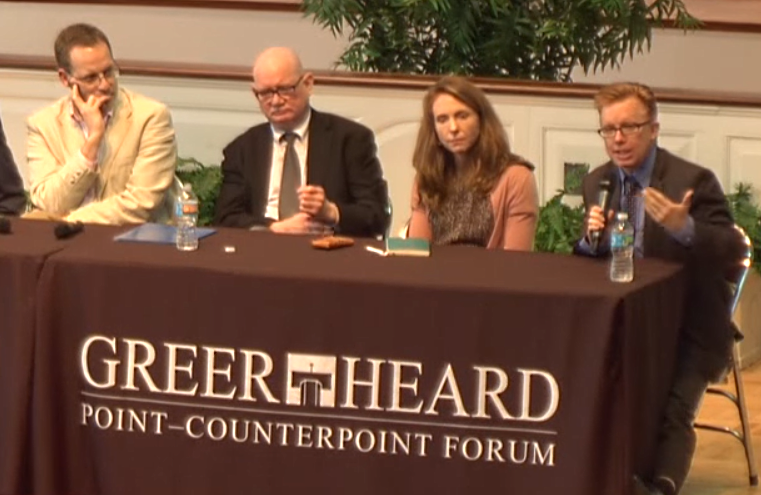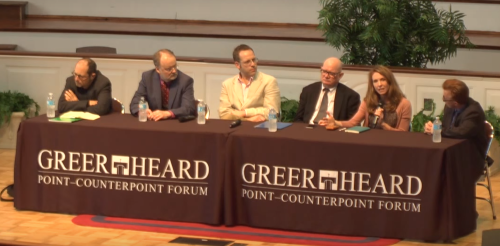Podcast: Play in new window | Download
Subscribe: Spotify | Email | RSS
 Should Dr. Ehrman become a member of “the early high christology club”? In this final installment, we hear a bit more from Dr. Bird and Dr. Ehrman, as well as their fellow presenters, including Dr. Larry Hurtado, in this concluding panel discussion at the 2016 Greer-Heard Point-Counterpoint Forum.
Should Dr. Ehrman become a member of “the early high christology club”? In this final installment, we hear a bit more from Dr. Bird and Dr. Ehrman, as well as their fellow presenters, including Dr. Larry Hurtado, in this concluding panel discussion at the 2016 Greer-Heard Point-Counterpoint Forum.
Dr. Ehrman summarizes his narrative about the early development of christology. Other speakers explore various themes in relation to history and Christian belief. And Dr. Bird gets the final word; he says that Jesus acted with “a sense of unmediated authority.”
Subjects discussed include:
- Does it matter if our best historical investigations conflict with Christian claims?
- Is the subject-matter of Christian theology God, or Christian beliefs about God?
- [spp-tweet tweet=”Does the New Testament blur the distinction between Jesus (God’s agent) and God (whose agent Jesus is)?”]
- Should a theologian lay aside issues of truth, and focus on just the coherence of the believer’s outlook, or on how various viewpoints strike us on a gut level?
- What is the point trying to show that one’s christology best fits the gospels, or even the beliefs of Jesus himself, during his earthly ministry?
- [spp-tweet tweet=”Was Jesus omniscient during his whole earthly life?”] If not, how could Jesus have been fully divine? Isn’t omniscient an essential divine attribute? Should a Christian think that Jesus “emptied himself” of omniscience, or of the use of it, during his earthly life? Is this a traditional catholic approach to Jesus’s apparent non-omniscience in the gospels?
- Do Ehrman and Hurtado share many fundamental points of agreement when it comes to early christology?
- Did Jesus’s early followers infer his pre-existence and full, eternal deity from his resurrection and exaltation?
- Who do you say that Jesus is? God? God’s Messiah? Or merely a failed Jewish prophet?
Let us know what you think in the comments below, in our Facebook group, upload audio feedback for possible inclusion in a future episode of this podcast, putting the audio file here.
You can also listen to this episode on YouTube ( subscribe here). You can support the trinities podcast by ordering anything through Amazon.com after clicking through one of our links. We get a small % of your purchase, even though your price is not increased. (If you see “trinities” in you url while at Amazon, then we’ll get it.)
 Links for this episode:
Links for this episode:
- Greer-Heard Point-Counterpoint Forum
- Dr. Larry Hurtado’s blog, Dr. Bart Ehrman, Dr. Dale Martin, Dr. Jennifer Wright Knust, Dr. Simon Gathercole, Dr. Michael Bird
- “How an atheist became a leading Christian scholar“
- podcast 99 – Dr. Larry Hurtado on early high christology
- podcast 100 – Dr. Larry Hurtado on God in New Testament Theology
- podcast 61 – Dr. Dustin Smith on preexistence in ancient Jewish thought
- podcast 62 – Dr. Dustin Smith on the preexistence of Jesus in the gospel of John
- Irenaeus, Against Heresies II.28.6, 8
- Francis X. Gumerlock, “Mark 13:32 and Christ’s Supposed Ignorance: Four Patristic Solutions”
- Edwin K. P. Chong, “On Jesus’ Eschatological Ignorance“
- “Only God can forgive sins.” False.
- Dr. Stephen T. Davis, “The Metaphysics of Kenosis”
- Dr. Stephen Evans, ed., Exploring Kenotic Christology: The Self-Emptying of God
- Hurtado on the early worship of Jesus
 Dr. Jonathan Z. Smith, Drudgery Divine: On the Comparison of Early Christianities and the Religions of Late Antiquity
Dr. Jonathan Z. Smith, Drudgery Divine: On the Comparison of Early Christianities and the Religions of Late Antiquity- podcast 16 – How is Jesus “the one Lord”? (on 1 Corinthians 8:4-6)
- Texts discussed: Matthew 24:36, Mark 13:32, John 14:28, Mark 2:1-12, Matthew 9:2-8, John 20:23,Matthew 16:13-20, Psalm 110:1
- This week’s thinking music is “A Human Being“ by Andy G. Cohen. Released under a Creative Commons Attribution International License https://andyg.co/hen/songs/human

Dr Knust was a little bit annoying. There is this idea With some contemporary theologians or “religious studies” People that one can seperate history from faith. You can’t, Reza Aslan popularized the Christ of faith and the Jesus of history dictomy, the problem is that they are on in the same, if Jesus the historical person didn’t get ressurected then there is no Christ of faith.
Bart Ehrman doesn’t focus on the humanity of Jesus, he does history from an atheistic worldview, of course that’s going to, by definition focus on the humanity of Jesus, doing history allowing for miracles or Divine revelation doesn’t defocus on the humanity of Jesus, it allows for more. Also no one cares what story she prefers, history is not a relativistic free for all, there are more, and less plausable stories, which is what the debate was over.
People who say they are confessional Christians, but then basically Accept the naturalistic narrative should be asked why they are confessional Christians? If she agrees With Bart Ehrman that Jesus wasn’t buried, then why does she believe Jesus was raised? If she doesn’t believe that, then why is she a Christian? But if she does, then doesn’t the history actually matter for her faith?
Comments are closed.